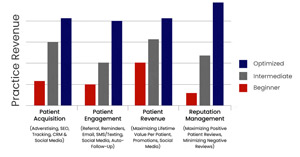Expert Mental Health & Behavioral Health Marketing Services $799 to $999/mon
1 out 5 Americans live with a mental health condition. Marketing for Mental Health Providers Costs $799/mon to $999/mon.
Typically mental health conditions cover mental health conditions such as schizophrenia, PTSD, bipolar, borderline personality disorder, ADHD, OCD, depression, anxiety, eating disorders, suicide, addiction and others. The concept of telehealth for mental health is much older than you may think. The roots of it are over 100 years old! Dr. Willem Eithoven, the inventor of the EKG, figured out a way to send medical data over telephone wires in the early 1900’s. In the 1920s, magazines that predicted the future thought that one day that patients could get medical information by tuning into specific radio stations to listen to their doctor. The first actual use of telehealth as we know it today occurred in 1955 when a doctor established a closed-circuit TV connection with another facility over 100 miles away. Since that first connection, development has been slow. Still, it began to pick up new interest with the invention of the internet and the proliferation of smartphones connected to high-speed networks. Companies began to spring up, development in telehealth and offering those services to doctors and regional medical groups. In this process, the final speed bump was convincing insurance companies to pay for this service, which many resisted at first.
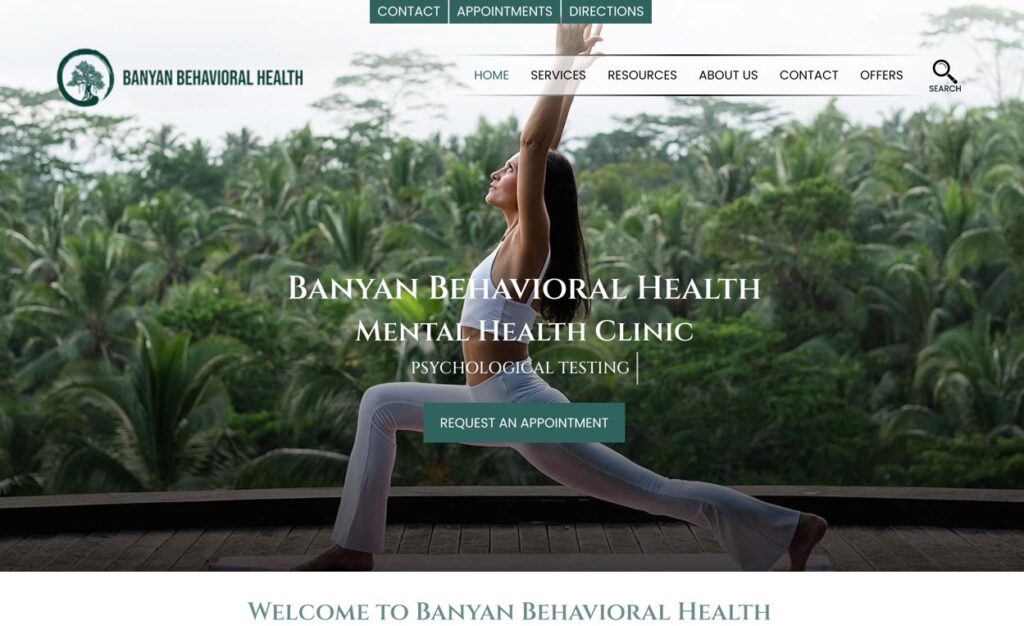

Behavioral health VS mental health
While often used interchangeably, “behavioral health” encompasses a broader spectrum than “mental health,” including mental health but also encompassing behaviors and habits that impact overall well-being, including physical health.
Mental Health
Focus: Primarily on an individual’s psychological and emotional well-being, including thoughts, feelings, and social interactions.
Examples: Mental health conditions like depression, anxiety, and bipolar disorder.
Treatment: Often involves psychotherapy, medication, or a combination of both.
Behavioral Health
Focus: A broader perspective that includes mental health, but also considers behaviors and habits that impact physical and mental well-being.
Examples: Substance use, unhealthy eating habits, lack of exercise, and sleep disturbances, in addition to mental health conditions.
Treatment: May involve therapy, counseling, behavioral interventions, and addressing underlying factors that contribute to unhealthy behaviors.
Holistic Approach: Recognizes the interconnectedness of mental and physical health, aiming to promote overall well-being.
In essence:
Mental health is a specific aspect of overall well-being, while behavioral health is a broader concept that encompasses mental health and other factors that influence behavior and health outcomes. Behavioral health professionals may address both mental health conditions and behaviors that impact overall health, taking a holistic approach to care.
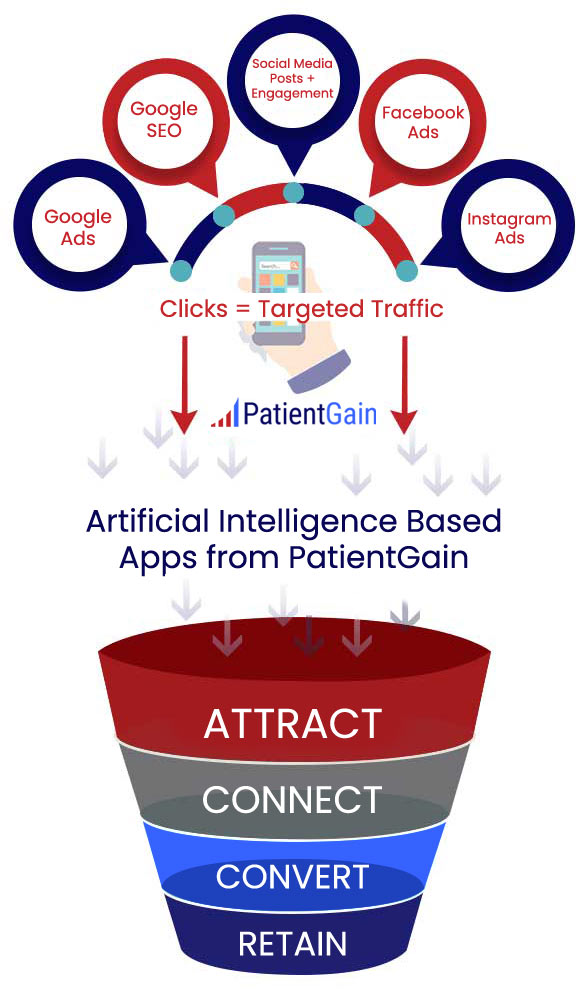
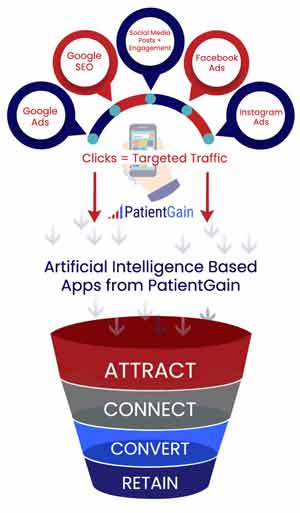
However, with the COVID-19 pandemic causing widespread lockdowns across the country, many insurances temporarily changed their policies to make telehealth possible for more customers. This has been an incredible benefit to those seeking mental health. During the pandemic, it allowed them to continue treatment for their mental health. Many articles have been written about how popular this has been with patients, and many insurances are likely to continue to promote telehealth. As a mental health provider, it is only to your advantage to promote and market telehealth for mental health sessions at your business. It will be difficult to play catch up if all of your competitors are already promoting this feature at their locations.


What Does a Good Marketing Company for Mental Health and Behavioral Health Centers Do?
A high-quality marketing company specializing in mental health and behavioral health centers focuses on strategies that not only promote the services offered but also align with the sensitive nature of the field. Their goal is to build trust, foster awareness, and connect patients with the care they need. Here’s what a top-notch marketing company does:
1. Develops a Customized Marketing Strategy For Mental Health and Behavioral Health Centers; A personalized strategy ensures marketing efforts resonate with your specific audience and goals.
- Tailored Approach: Creates a strategy specifically designed for your center’s services, target audience, and mission.
- Focus on Stigma Reduction: Promotes mental health care in a way that normalizes seeking help and reduces stigma.
- Comprehensive Plan: Balances Social media, SEO, Website conversions, AI agents, HIPAA compliant CRM, offline, and community-based marketing efforts.
2. Builds and Enhances Your Online Presence: A strong online presence helps potential patients find your center and learn about your services easily.
- Professional Website Development:
- Designs a user-friendly, mobile-responsive website that reflects your center’s mission and services.
- Incorporates easy navigation, clear calls-to-action (CTAs), and online appointment scheduling.
- Search Engine Optimization (SEO):
- Optimizes website content to rank for relevant keywords like “anxiety therapy near me” or “behavioral health services in [City].”
- Focuses on local SEO to attract nearby patients.
- Social Media Marketing:
- Creates engaging, stigma-reducing content tailored for platforms like Facebook, Instagram, and Google My Business (GMB).
- Promotes mental health tips, patient success stories (with consent), and educational posts.
Example of Mental Health and Behavioral Health practice with 9 locations, eastern US. You can see that in the month of July, there are 2230 new patient inquiries (leads)
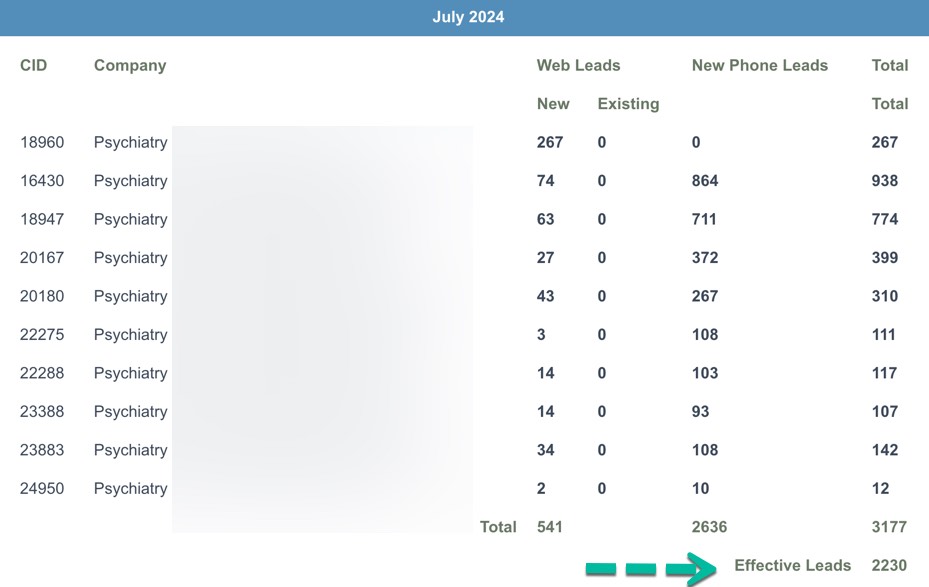
Digging further, you can see 53% of leads are from organic SEO, and 23% of the leads are from paid ads. The clinic has been in business for 11 years so 19% of the patients are searching by name (direct)
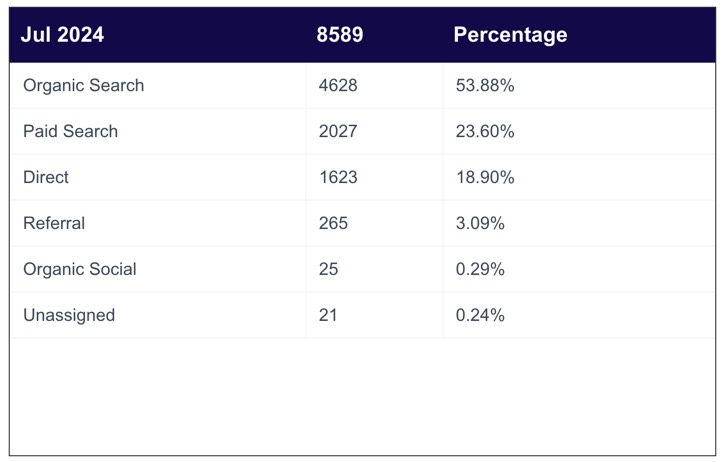
3. Creates Educational and Compassionate Content: Educational content builds trust, positions your center as a thought leader, and engages your audience.
- Content pages: Writes informative blogs about mental health topics, such as “Signs You May Need Therapy” or “Coping Mechanisms for Anxiety.”
- Videos: Produces short, compassionate videos introducing therapists, explaining treatment options, or sharing wellness tips.
- Infographics: Designs visually appealing resources to simplify complex topics like mental health disorders or treatment plans.
4. Implements Targeted Advertising Campaigns: Targeted advertising ensures your center reaches the right audience at the right time.
- Google Ads: Creates pay-per-click (PPC) campaigns targeting patients searching for mental health services.
- Social Media Ads: Runs targeted campaigns to reach individuals interested in therapy, counseling, or behavioral health topics.
5. Reputation and Reviews App: A strong online reputation builds trust and reassures potential patients about the quality of your care.
- Online Reviews App: Your practice’s reputation on Google search is the single most important strategy that you should implement. Other review sites are important but start with Google first, then follow up with healthcare specific review sites. We know that Google’s paid search produces excellent results for medical healthcare clinics. Within Google search results, one of the most powerful visual aspects is the number of Google+ reviews in the search results.
- Encourages Positive Feedback: Implements systems for collecting reviews from satisfied patients.
- Professional Responses: Addresses negative reviews with empathy and professionalism, ensuring privacy is maintained.
6. Ensures Compliance with HIPAA: Compliance safeguards your center’s reputation and protects patient confidentiality.
- HIPAA Compliance: Ensures marketing efforts protect patient privacy and follow healthcare CRM data
- Ethical Messaging: Avoids making exaggerated claims and ensures all content is medically accurate and compassionate.
- Accessibility: Designs websites and materials to be inclusive and accessible to individuals with disabilities.
7. Tracks and Analyzes Campaign Performance: Data-driven decisions optimize marketing efforts and ensure your center achieves its goals.
- Key Metrics: Monitors website traffic, social media engagement, ad performance, and lead generation.
- Adjusts Strategies: Refines campaigns based on data insights to improve medical marketing ROI.
- Transparent Pricing: Provides live dashboards with actionable recommendations from a professional project manager.
8. Strengthens Brand Identity: A strong, recognizable brand fosters trust and ensures your center stands out.
- Logo and Visuals: Develops a cohesive brand identity with professional logos, colors, and typography.
- Mission-Focused Messaging: Ensures all marketing materials reflect your center’s values and approach to care.
- Consistency Across Platforms: Maintains a unified voice and visual presence across digital channels.
Summary of Key Services
A good marketing company for mental health and behavioral health centers should:
- Develop customized, stigma-sensitive strategies.
- Build a professional, optimized online presence.
- Create educational and compassionate content.
- Run targeted advertising campaigns.
- Reputation and Reviews App.
- Foster community relationships and referral networks.
- Ensure compliance with healthcare and privacy standards.
- Analyze performance and provide actionable insights.
- Offer excellent customer service and communication.
- Strengthen your brand identity.
Summary
Medical marketing for mental health practices primarily focuses on building trust and accessibility through a strong online presence, utilizing Google My Business, Google SEO Search, social media engagement (20 posts per month), informative content creation, local SEO optimization, and a user-friendly website design, all while prioritizing patient privacy and addressing potential stigma surrounding mental health issues.
By focusing on these areas, a great marketing company can help mental health and behavioral health centers grow while maintaining sensitivity to the unique needs of their audience. The experts at PatientGain.com can help a mental health providers market telehealth sessions to their patients and community. We have helped other doctors and mental health providers promote this service around the country. Let our experienced team show you what we have done for others and how we are ready to work to meet your goals!
